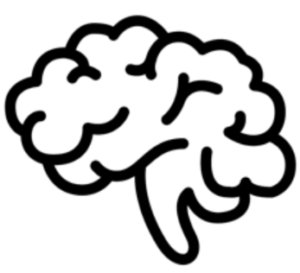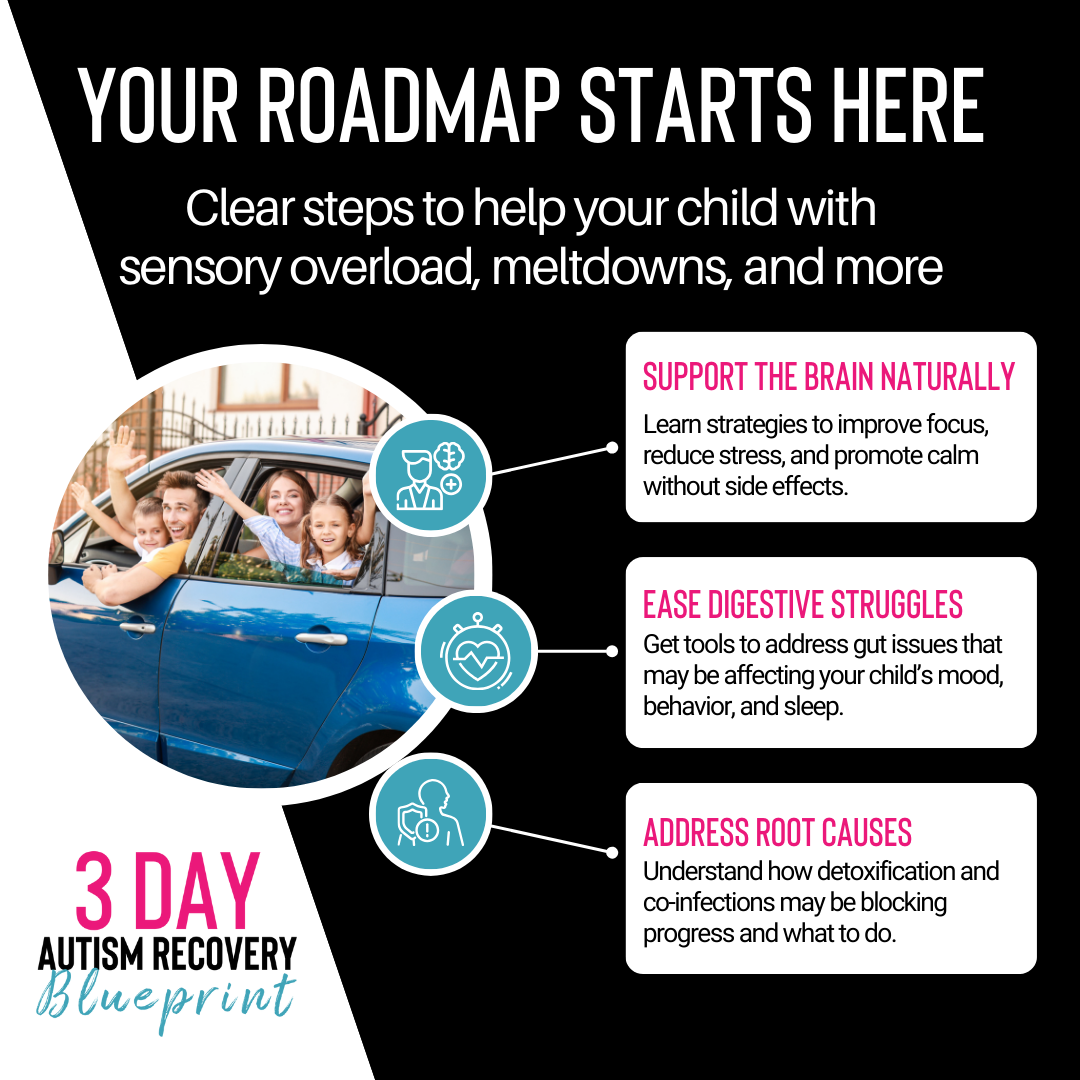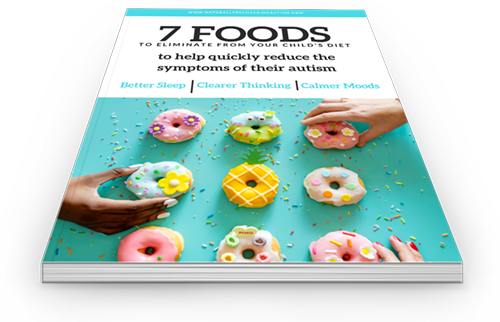Many people have come to fear anything with fat in it. The diet industry says to avoid all fats. This is false information and can be dangerous to your health. We need fats in our diet. Cells are made of fat, and the brain is 60 percent fats so make sure you are eating enough of the right kinds to feed them. The key is to eat the good fats and avoid the bad ones. 
BAD FATS: Trans fats, hydrogenated or partially hydrogenated fats
We are all at risk from too many bad fats in our diet, but for children on the autism spectrum they are especially dangerous. One of the worst aspects of bad fats is their high content of omega 6 fatty acids. When the ratio of omega 6 fat is higher than omega 3 essential fatty acids the omega 6’s push out the omega 3’s and further deplete them in the body. Without enough omega 3’s behavior, mood, and focus are just a few of the concerning issues.
Trans fats are hydrogenated or partially hydrogenated fats, also known as plastic fats. These chemicals were created in the 1920’s to help prevent food from spoilage. Spoilage lowers profits. Unfortunately, these chemicals also preserve the cells in your body. They create a plastic film around the cells making them ineffective. When the body signals that it is hungry glucose and insulin are released. When they reach the cell membrane it has become impermeable to the glucose and insulin due to its plasticity. The cell continues to send messages of hunger but receives nothing. This is why people who eat Trans fats continue to gain weight. This causes insulin resistance which leads to type II diabetes.
Trans fats also cause the liver to become plastic. It cannot properly remove toxins coming through it. This causes immune system failure and chronic diseases such as fibromyalgia. The liver also makes bile which is responsible for the digestion of fats. Bile is stored in the gallbladder. Without enough bile you get nauseous.
Bad fats include, but are not limited to, vegetable oils such as canola, sunflower, soy, and corn
In order to repair the liver you must eat good fats, about seventy-five percent saturated animal fats and twenty five percent polyunsaturated fats such as fish oil. The liver must be able to handle these fats coming in to heal.
Remember that all the cell membranes are becoming plastic including brain cells. New cells are built from surrounding materials. You can offer your body plastic or healthy fats to do so. Trans fats can lead to depression, chronic fatigue, attention deficit, and foggy thinking. These bad fats can impair the body’s ability to build and maintain adequate amounts of neurotransmitters which regulate such things as mood. According to Public Health Nutrition those who ate more pastries and fast food were 41 percent more likely to develop depression than those who ate none.
GOOD FATS
Between 1910 and 1970 Americans went from eating 83 percent animal fats down to 62 percent. During this same time period the consumption of sugars and processed foods increased 60 percent. The consumption of butter went from eighteen pounds per person per year to four pounds. We have been falsely taught that fats, all fats, are bad for us. Unfortunately, this caused vegetable oils and refined oils to increase by 400 percent. Margarine is linked to building bad cholesterol and heart disease, NOT butter.
There is such a thing as good fats. In fact, good fats are essential to our health in many ways. We will talk further in much detail about omega 3 fatty acids, but in general, good fats like saturated/animal fat and polyunsaturated fat from fish oil is best. They assist the brain, strengthen the immune system, and reduce inflammation.
The omega 3 component DHA (docosahexaenoic acid) is particularly important in brain health, synapse health, assisting the brains circuitry, and in its ability to function. Several studies have shown low levels of DHA fats to increase depression and that increasing its intake relieves it. (Weidner, Conner, Conner and Hollis, Improvements in hostility and depression in relation to dietary change and cholesterol lowering. Annuals Internal Medicine 117(1992):820-823.)
Animal and vegetable sources of saturated fat provide sustained energy, building blocks for cell membranes, hormones, and other chemical processes in the body. They also assist in the absorption of the necessary fat soluble vitamins A, D, E and K.
Animal fats (organically grown) are essential to health. Vegetarians do not like to hear this but it is difficult to supply the brain with enough essential, non synthetic, B vitamins and healthy fats on a strict, animal free diet.
Saturated fats are not the cause of heart disease or cancer. Eating good fat does not affect your cholesterol or contribute to excessive weight gain. You actually need cholesterol to maintain liver health.
Short chain, saturated fatty acids such as butter and coconut oil are easily absorbed for quick energy, do not need bile salts to break down, and contribute the least toward weight gain. They also have antibacterial and antifungal properties. Extra virgin, organic olive oil is an excellent choice too. Be sure it’s cold-pressed.
ANIMAL FATS
Broth from homemade meat or fish stock is exceptionally healing. Animal fat contains the nutrients that nourish the cells of the gut lining which helps to heal it and keep it healthy. It also helps to reduce inflammation in the gut.
Eggs are a fabulous food source and one of my favorite. The entire egg, white and yolk, are both extremely healthy sources of protein, vitamins such as B, D and E, minerals such as zinc, and the amino acid tryptophan. Tryptophan helps to build the neurotransmitter serotonin which assists in a calming mood.
MORE GOOD FATS
Extra Virgin Olive Oil: cold pressed and organic
Coconut oil
Avocados
Walnuts
Assistance With Digestion Of Fats
Enzymes can be extremely helpful with the sensitive digestion needs of those with autism, ADHD, allergies, and more. Fats can prove difficult to digest if the liver and gallbladder are not working efficiently. Lipase enzymes help specifically with the digestion of fats. They can be very helpful with this process especially while the body’s detoxification pathways and gut are still healing. By improving digestion there can be a reduction in inflammation in the GI tract, therefore, better overall health.
Nausea after eating is a common sign of a weak gallbladder. Working to support the liver and the gallbladder is important.
Please pass this information and website onto those you know who could benefit from it. Thank you!
Please share!
Join the Autism Recovery Blueprint for Parents of Children with Autism
Discover natural strategies to improve your child’s communication, social skills, behavior, and overall well being during this FREE 3 day action plan.
JANUARY 21-23, 2026
9 AM PT | 12 PM ET
1-HOUR DAILY FOLLOWED BY LIVE Q&A
Navigating the realm of autism can be challenging. I know I’ve lived it, too. But you don’t have to do this alone. For the sum of zero dollars, you can join our community of dedicated parents who are actively shaping brighter futures for their children through this enriching 3-day experience. It is my gift to help ease your journey.
Our 3-Day Autism Recovery Blueprint serves as a guiding light on your journey, offering affordable, proven strategies and the support of a caring community.
This is for informational purposes only and is not meant to diagnose or treat. Every child’s level of recovery is different. No two people are the same. It is never implied that all children will have the same outcome. Results are all based on individual biology and the work that is done. This process takes time and various steps, effort and resources need to be weighed. Our programs are intended to help you become more knowledgeable and guide you to help bring your child a better quality of life, whatever that may be. We want to help by giving great content, direction and strategies that move you forward. Nothing on this page or any of our websites is a promise or guarantee of results or future outcomes. The results on this page and any of our websites are not typical or promised. In fact, there will be people who purchase this and other programs and never put the work into implementing the strategies taught and therefore will achieve little to no results. Our more detailed earnings disclaimer, privacy policy, and terms and conditions for this program and website can be accessed via the links below. We hold ourselves (and you) to a high standard of integrity. We are cheering you on every step of the way.












